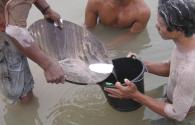At-A-Glance Views

Exposure to high levels of mercury can permanently damage the brain and kidneys and has been shown to affect a developing fetus, even months after the mother's exposure. In the aquatic environment, mercury can be transformed into methylmercury, a compound that is more toxic at low doses than pure mercury, absorbed by sea life, and then ingested by humans and other animals that eat seafood.
Mercury-Free Campaign
IPEN launched its Mercury-Free Campaign to address the alarming level of environmental and human health threats (such as permanent damage to the nervous system and kidneys) posed by mercury around the world. Through the Campaign, IPEN is aiming to build a robust base of civil society and non-governmental organizations (NGOs) working to raise awareness about mercury threats and support the development of a strong global treaty to eliminate or significantly reduce these threats. Participating NGOs from all over the world work together to share information, experiences and capacities with the aim of promoting international policy changes, national heavy metals policy awareness, and other actions targeted at advancing a non-toxic environment agenda.
The objectives of the Mercury-Free Campaign are to:
- Raise awareness about mercury exposure and safer alternatives;
- Reach-out to and educate and engage public interest and civil society organizations to promote mercury-free policies with their local and national decision-makers; and
- Implement the global mercury treaty (which entered into force in August 2017) and push for improvement of the treaty text.
Activities carried out within this Campaign include:
- Mercury monitoring activities such as surveys on mercury-containing products and the availability of mercury-free alternatives, etc.;
- Capacity building: Civil Society Organization and NGO trainings (see An NGO Introduction to Mercury Pollution);
- Promoting the need for sound chemicals management and national and international policy changes by awareness-raising campaigns;
- Promoting NGO policy engagement by global civil society and enhancing the dialogue between NGOs and decision-makers (See IPEN Views on a Global Mercury Treaty);
- Developing and distributing publications with relevant scientific data on mercury;
- Supporting NGOs in developing countries and countries with economies in transition across Asia, Africa, Central/Eastern Europe and Latin America in improving chemical safety;
- Supporting programs or activities that link to international mercury discussions; and
- Providing a frame for Civil Society contributions to the Global Mercury Treaty process by tracking global activities and developing global NGO reports as contributions to international meetings.
Main Right Block
Debug toxic priority variant


